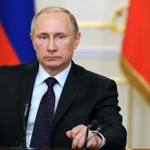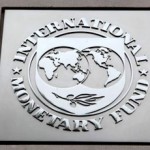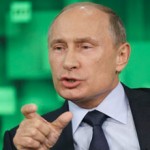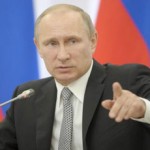Putin Tests English Debt Law as Ukraine Feud Heads to London
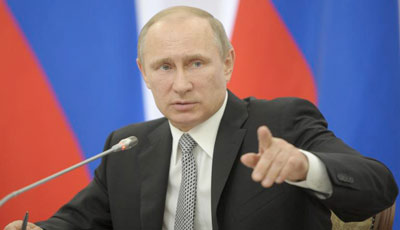
-
Dispute challenges IMF rules on lending to nations in arrears
-
Court case would be `fabulous’ to watch, debt scholar says
Russia and Ukraine are about to test the boundaries of sovereign-debt litigation in a dispute that could have far-reaching implications for government bailouts the world over.
The neighbors are vowing to fight each other in a London court over a $3 billion bond Vladimir Putin bought to reward his Ukrainian ally, Viktor Yanukovych, for rejecting closer trade ties with the European Union two years ago. That move fueled the protests in Kiev that led to Yanukovych’s ouster, Putin’s annexation of Crimea and an insurgency that’s killed 8,000 people.
Ukraine’s government, on life support from the International Monetary Fund, says Russia has until Oct. 29 to agree to the same writedown and extension that Franklin Templeton, which manages the largest U.S. overseas bond fund, and most other creditors accepted this month. Russia’s Finance Ministry says it won’t negotiate and is shopping for a law firm to file suit as soon as Ukraine makes good on its threat to default when the bond comes due Dec. 20.
“This issue will go to court, there’s no other way around it,” said Christopher Granville, a former U.K. diplomat in Moscow who runs Trusted Sources research group in London. “There’s no way Russia will remain under financial sanctions from the U.S. government and accept the same terms as Franklin Templeton.”
Unusual Bond
The bond is unusual for a state-to-state loan. It was drafted as a commercial instrument under English law, meaning any dispute will be settled by a judge in the U.K. It also contains a clause designed to prevent Ukraine from offsetting its debt due to damages inflicted by Russia, such as the annexation of Crimea, which President Petro Poroshenko plans to seek compensation for.

Ukraine’s government, which accuses Yanukovych and his allies of stealing tens of billions of dollars before fleeing to Russia, says the bond should be considered commercial and treated the same as debt held by private investors.
“This $3 billion was in reality a bribe from Russia, so that President Viktor Yanukovych would stop the association agreement with the EU,” Prime Minister Arseniy Yatsenyuk told German newspaper Handelsblatt this week.
Russia maintains the loan is official, a designation that would, if Ukraine doesn’t pay, force the IMF to either end its $17.5 billion bailout or alter its policy of not lending to any country that’s in arrears to another. The crisis lender has said it will only decide on the classification if Ukraine defaults.
‘Fabulous’ Case
Either way, the showdown is shaping up to be one of the most unique cases in memory, one followed closely by governments and scholars around the world, including Mitu Gulati, a law professor at Duke University who specializes in sovereign debt.
“This kind of court case has never really happened before,” Gulati said. “To see the argument play out as to what Russia owes Ukraine because of its involvement in Crimea, to have that be in court in London would be fabulous.”
A court defeat could cause “great embarrassment” for Putin if a judge seeks to determine if Russia already had plans to annex Crimea when the bond documents were drawn up, according to Gulati. A victory, on the other hand, would give him another lever to influence Ukraine by allowing Russia to block payments to other creditors until it’s paid back, he said.
A protracted legal battle by itself would be more painful for Ukraine than Russia, which is already under international sanctions over its role in an armed conflict that has ebbed as its military focuses on bombing targets in Syria. It would complicate efforts by Poroshenko, who is seeking to distance Ukraine from its former Soviet master, to rebuild a war-torn economy and delay a return to international capital markets.
“This case could throw sand in the wheels of many international transactions by Ukraine,” said Christoph Trebesch, a debt scholar who teaches economics at the University of Munich. “It’s a hassle to waste time in court instead of rebuilding the country and attracting foreign investors.”
Source: Bloomberg – Putin Tests English Debt Law as Ukraine Feud Heads to London









